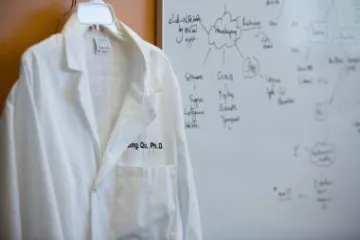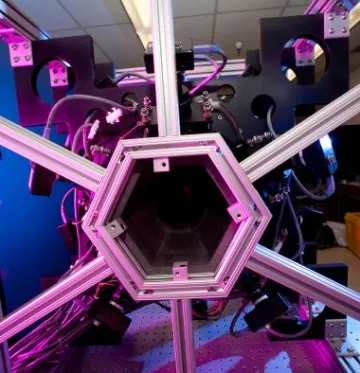Why ABBS?
The Arizona Biological and Biomedical Sciences Program (ABBS) integrates recruiting and admissions for the following graduate PhD programs in biological and biomedical sciences: Biochemistry and Molecular & Cellular Biology, Cancer Biology, Drug Discovery and Development, Genetics, Medical Pharmacology, Molecular Medicine, Pharmaceutics and Pharmacokinetics, Pharmacology & Toxicology, Physiological Sciences, and Plant Sciences.
Student accepted into ABBS are fully funded by a Graduate Assistantship, which includes payment of a stipend, tuition, registration fees, and health insurance. Students are only financially responsible for their student and miscellaneous fees. Students are admitted to the ABBS program with no formal commitment to a particular PhD program. Students take two instructional courses, one journal club, and one seminar course each semester, and they perform three laboratory rotations with faculty in any of the participating graduate programs. This provides maximum flexibility for students to shape their own curriculum within the available fields of study. Students can focus immediately on a particular research area and program or they can explore various options.
At the end of the third rotation, students join a lab and matriculate into one of the ten participating graduate programs.
For a more complete look at the program or to view all of our policies, please click the link below for the ABBS Handbook.
Our campus is taking the COVID-19 pandemic seriously. You can find response and mitigation information here: https://covid.arizona.edu/. Please be aware that all our admitted students are hired and funded as a Graduate Assistants and are thus required to comply with the employee vaccine requirement or provide documentation of a religious or disability/medical accommodation. You can read more about the requirement here: https://hr.arizona.edu/content/employee-covid-19-vaccine-requirement.
Plentiful Possibilities

As an interdisciplinary program, the ABBS program at the University of Arizona gives you access to ten Ph.D. programs through one application process. Students can rotate through any participating faculty lab, and they may devise select curricula that optimally fit their research interests. This provides the perfect environment for first year students to discover their ideal mentor and research direction.
“I liked the diversity and the broad range of research options. Since I was undecided about my research goals, this was a great way to explore multiple avenues.” - student in IMB
“Because of the integrative nature of the program. Lots of options is good when you haven't decided your path in detail.” - Kotaro Fujimaki
High Ranking and Consistent Funding
The following ABBS programs ranked in the top 10 by the NRC 2011 report:
- Medical Pharmacology - 3rd in Research Activity
- Plant Sciences - 5th Research Activity
- Pharmaceutical Sciences - 3rd overall
- Physiological Sciences - 10th overall
The following ranked in the top 20:
- Genetics - 19th overall
- Immunobiology - 19th overall

The National Science Foundation ranks the UA 20th in research and development expenditures among US public universities and colleges and 33rd among US public and private universities, from greater than $588 million dollars in federal R&D expenditures from 3000 research projects.
The NSF also ranks the UA No. 1 in physical sciences research among US public institutions. U.S. News & World Report ranks the UA among America’s Best Colleges and the Princeton Review lists the UA as one of “The Best Western Colleges.” The UA ranks No. 68 in the world and No. 42 nationally according to the Center for University World Rankings.
The UA is one of the nation’s top producers of Fulbright Scholars. The University of Arizona is a member of the prestigious Association of American Universities (AAU). It is one of 62 leading public and private research universities in the United States and Canada and the only AAU member in Arizona. Membership in AAU is by invitation and is based on the high quality of programs of academic research and scholarship and undergraduate, graduate, and professional education, as well as general recognition that a university is outstanding by reason of the excellence of its research and education programs
Our faculty and mentors were once in your shoes -- discovering their own passion and weaving their own story and project. They are among the top in their fields and are eager to share their passion with you. Whether you are designing a new experiment, learning a new technique, or preparing a new publication, our faculty are there to support you through the whole process.
Abundant Resources

There is a vast array of resources available both on campus and within the labs. This enables students and faculty to conduct cutting-edge research. The faculty are highly collaborative with each other and with the students. The research environment encourages and rewards interdisciplinary interactions. Due to the interdisciplinary nature of the program, you’ll feast on interconnected experiences across multiple fields, disciplines, and cultures. You will never be limited to the experiments happening in your lab.
The University has
- a National Cancer Institute-designated Comprehensive Cancer Center, making a cancer a highly productive basic and translational focus in the College of Medicine;
- the BIO5 Institute, inspiring innovation, education, and collaboration across the research disciplines;
- Center for Toxicology and the Southwest Environmental Health Science Center, supported by National Institute of Environmental Health Sciences;
- Cyverse, supported by a $50 million grant from the National Science Foundation, is a cyberinfrastructure for the life sciences that is democratizing access to storage, sharing, and high performance computing;
- Center for Applied Genetics and Genomic Medicine, recently assisted by a $43 million award from the Precision Medicine Initiative sponsored by the National Institutes of Health;
- one of the world’s premier Colleges of Optical Sciences, powering advances in novel microscopic imaging methodologies;
- the Sarver Heart Center, leading the country in muscle physiologists and genetics; and,
- the Arizona Respiratory Center, a Center of Excellence, which is recognized as one of the top institution for respiratory care among hospitals nationwide.

